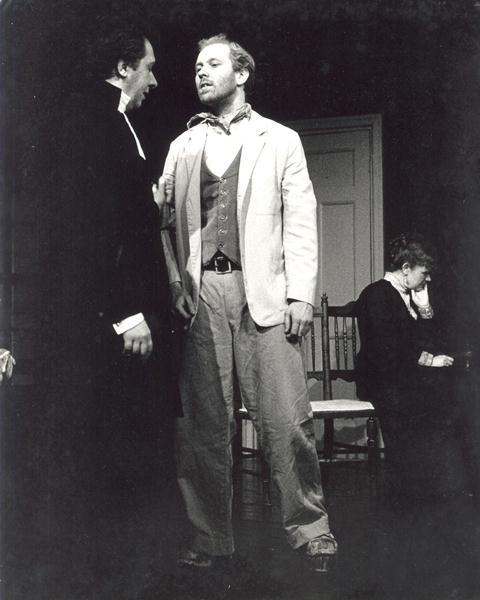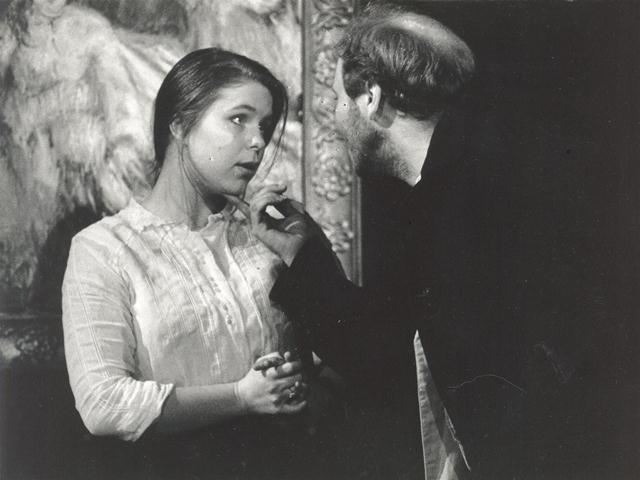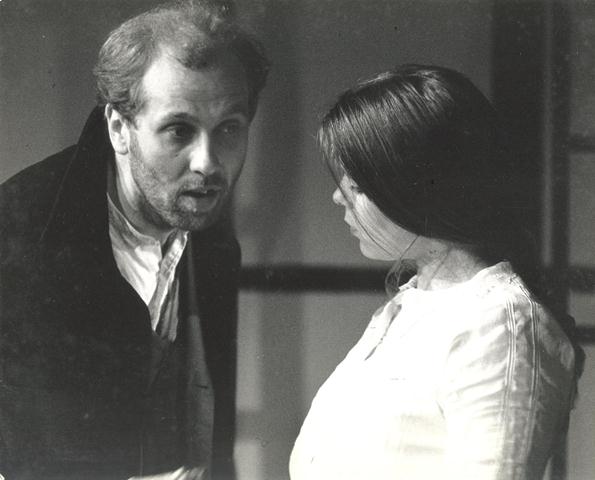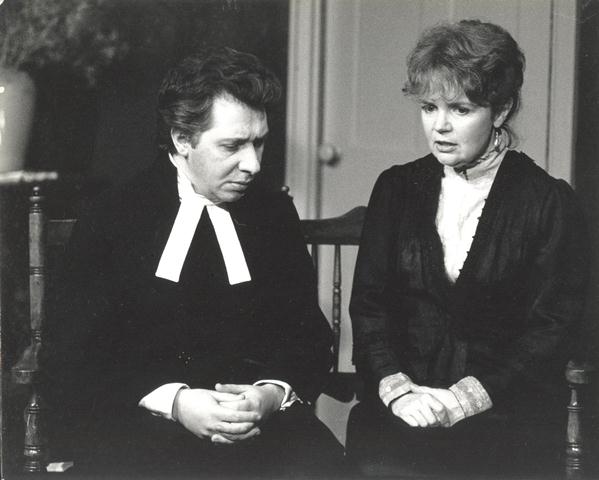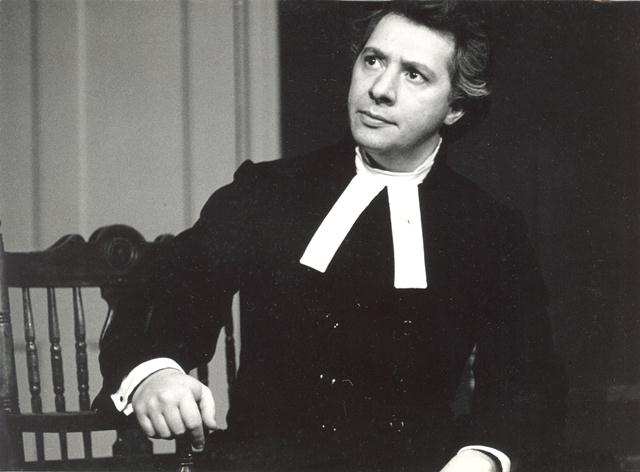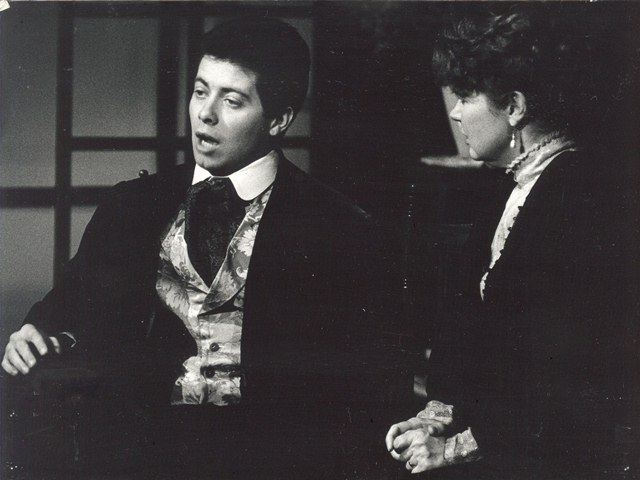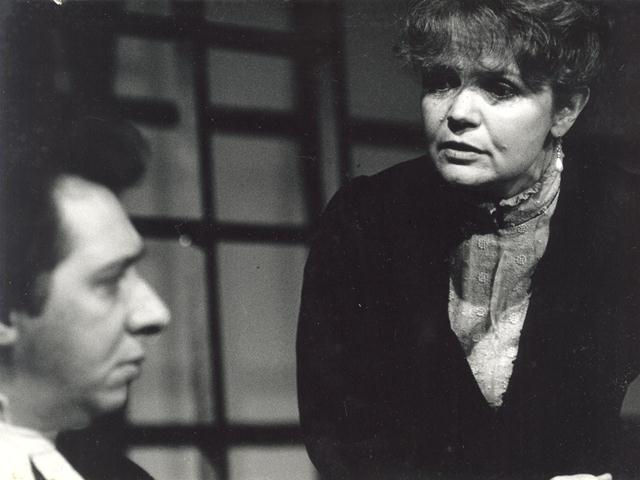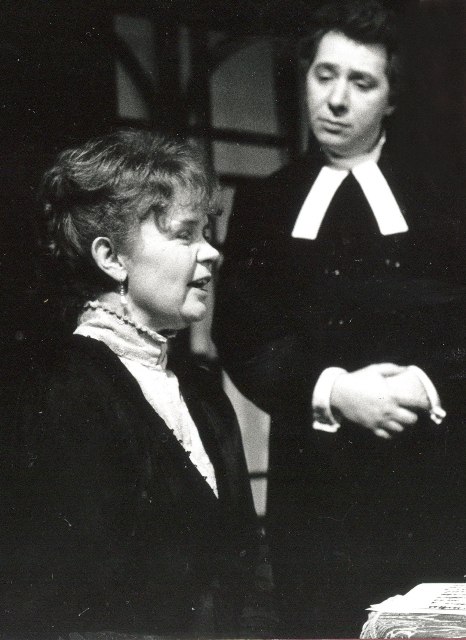Ghosts
Written by Henrik Ibsen (translated by Michael Meyer)
Thurs 21st February - Sat 23rd February & Mon 25th February - Sat 2nd March 1991
Directed by Jacquie Penrose
What is a woman to do? Seek love and self-fulfilment by abandoning a rotten husband, or obey society's rules and devote herself to her family? Mrs Alving, in Ibsen's classic drama, follows the call of duty, only to find the cost in human terms is cruelly high. Poignant, laughable, and very moving, 'Ghosts' touches nerves that are as sensitive today as they were a century ago.
previous
production
next
production
Henrik Ibsen (1828 - 1906)
Ibsen was a major 19th-century Norwegian playwright, theatre director, and poet. He is often referred to as the godfather of modern drama and is one of the founders of Modernism in the theatre. His plays were considered scandalous to many of his era, when Victorian values of family life and propriety largely held sway in Europe. Ibsen's work examined the realities that lay behind many facades, possessing a revelatory nature that was disquieting to many contemporaries. It utilised a critical eye and free enquiry into the conditions of life and issues of morality.
Ibsen was born to relatively well-off family and became an apprentice pharmacist at the age of 15. He fathered an illegitimate son at the age of 18 - (whom he never met) and later left for Christiania (Oslo) to try to attend university. He failed the entrance exams and started to concentrate on his writing. His first play 'Catiline', was published under the pseudonym Brynjolf Bjarme when he was only 20, but it was not performed. In 1858 he became the creative director of the Christiania Theatre and married Suzannah Thoresen the same year. She gave birth to their only child, a son, Sigurd in 1859. Disenchanted with the poverty and lack of recognition of his life in Norway, in 1864 he went to live in Italy.
His next play, 'Brand' written in 1865, was staged to critical and financial success, as was the following play, 'Peer Gynt' to which Edvard Grieg famously composed incidental music and songs. Ibsen moved from Italy to Germany in 1868, where he spent years writing the play he regarded as his main work, 'Emperor and Galilean' although very few shared his opinion about this play. Ibsen published A Doll's House in 1879 and Ghosts in 1881; both scathing commentaries on Victorian morality. 'The Wild Duck' written in 1884 is by many considered Ibsen's finest work, and it is certainly the most complex. In later plays such as 'Hedda Gabler' and 'The Master Builder', Ibsen explored psychological conflicts. These plays are particularly interesting because of their hard-edged, objective look at interpersonal confrontation.
Ibsen can be credited with completely rewriting the rules of drama with a realism which was to be adopted by Chekhov and others and which we see in the theatre to this day. He returned to Norway in 1891 and died in Christiania (now Oslo) after a series of strokes in 1906.
TranslatorMichael Meyer
Michael Meyer (1921 - 2000)
Michael Meyer is recognised internationally as the principal English-language authority on Ibsen. He was born in London into a merchant family of Jewish origin, and studied English at Christ Church College, Oxford. His first translation of a Swedish book was the novel 'The Long Ships' by Frans G. Bengtsson. His work appeared in the New York Review of Books. A playwright himself, his translations of many Ibsen's plays (as well as Strindberg's) are universally acclaimed. While he wrote acclaimed biographies of both these playwrights; it was the volume on Ibsen which is generally regarded as definitive - it won the 1971 Whitbread Award for Biography. His autobiography 'Not Prince Hamlet' was published in 1989.
top of page
'Ghosts' was originally written in 1881 (in Danish), first staged in 1882, and is a scathing commentary on 19th century morality. It was first performed in 1891 in England it also deals with the burdens of duty.
The plot follows Mrs Helene Alving as she is about to dedicate an orphanage, built in the memory of her dead husband, Captain Alving. She reveals to her spiritual adviser, Pastor Manders, that she has hidden how much of a sham her marriage, was, and has built the orphanage to deplete her husband's wealth so that their son, Oswald, might not inherit it. It seems that Pastor Manders had previously advised her to return to her husband despite his philandering. She followed his advice in the belief that her love for her husband would eventually reform him, however her husband's infidelity continued until his death. Mrs. Alving also chose not to leave him for fear of being shunned by her society. During the play she discovers that her son Oswald (whom she had sent away so that he would not be corrupted by his father) is suffering from syphilis, and (worse) has fallen in love with Regina Engstrand, Mrs. Alving's maid, who is revealed to be an illegitimate daughter of Captain Alving, and thereby Oswald's own half-sister. The play concludes with Mrs. Alving having to decide whether or not to help her son to die in accordance with his wishes. Her choice is left unknown.
top of page
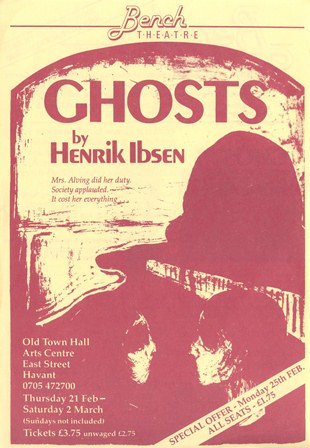
This play was staged at Havant Arts Centre, East Street Havant - Bench Theatre's home since 1977.
| Mrs Alving | Ingrid Corrigan |
| Pastor Manders | John Corelli |
| Oswald Alving | Alan Jenkins |
| Engstrand | David Hemsley-Brown |
| Regina Engstrand | Lisa Burrows |
Crew
| Director | Jacquie Penrose |
| Stage Manager | Aislinn D'Souza |
| Lights and Sound | Simon Norton |
| Costumes | Janet Simpson |
| Set Design | David Penrose |
| Set Construction | David Hemsley-Brown |
Director's Notes
A production of 'Ghosts' is a difficult undertaking from several points of view. The play comes trailing clouds of reputation: it's a once-scandalous play fit only for the museum - Ibsen is a gloomy writer isn't he - audiences will stay away in droves. Worse - especially for an amateur company - it has a long history of Great Performances behind it. And all that before you even get to the problems of interpretation. But having side-stepped all that baggage, the play reveals itself as astonishingly fresh. A century after Ibsen's great cry of anger against the dead weight of convention - after a century of reform and liberation - Mrs Alving's dilemma remains painfully real today: Should she put the needs of husband and child ahead of her own?
Duty and convention - time-honoured ghosts - say yes. Mrs Alving makes heroic efforts to free herself from their dead hand but she cannot, and both she and her child are destroyed. A gloomy conclusion certainly. And Oswald's syphilis, the metaphor that Ibsen has chosen to illustrate how the misdeeds of one generation (no matter how well disguised by respectability) will be visited on the next, may seem a little old-fashioned and lurid. (And yet... in our own day there are scourges hidden away in the nicest families, handed from generation to generation). But it is not all gloom; Ibsen shows us how laughable high-minded righteousness can be except when it has such awful consequences.
And will audiences stay away in droves? Perhaps such an 'old fashioned' play is not everyone's cup of tea, it seems. It would be nice to think that the play was out of date, that Ibsen's disgust in the face of cruelty of closed minds was no longer relevant. Sadly that is not the case; his ghosts, a hundred years older but not much wiser, still find plenty of darkness in which to flourish.
Jacquie Penrose
top of page
The NewsMary Williams
Finding the spirit of Ibsen
Many actors approach a performance of Ibsen's 'Ghosts' with trepidation - and the Bench Theatre at Havant appeared to be no different. The programme notes did not bode well, with Director, Jacquie Penrose warning of the burdens inherent in such productions. But the company gave an impressive interpretation of the play, which deals with the burdens of duty.
Ingrid Corrigan was masterful as the central character Mrs Alving, who is torn between her own needs and those which society places on her. John Corelli made the part of the self-important Pastor Manders his own, while Alan Jenkins caught the audience's sympathy with a convincing performance of a man at the end of his tether. Ghosts is at Havant Old Town Hall Arts Centre until March 2.
The News, 22nd February 1991
top of page
Production Photographs

